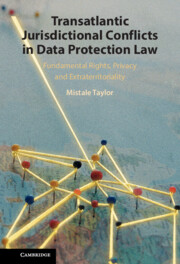 Transatlantic Jurisdictional Conflicts in Data Protection Law
Transatlantic Jurisdictional Conflicts in Data Protection Law Published online by Cambridge University Press: 06 April 2023
Simply being applicable could still permit far too much in terms of the extraterritorial reach of the EU’s data protection laws. The law of jurisdiction cannot solve all the present issues. It helps to solve conflicts in terms of sovereignty, but not fundamental rights. As such, this warrants a second-tier, additional set of criteria including degree of connection and interest-balancing as a rule of reason. The degree of connection between a regulated situation and the regulator, and interest-balancing are useful in assessing the legitimacy of the EU’s exercise of extraterritorial jurisdiction in the internet age, which throws traditional concepts of territoriality into question. Flowing from this, a rule of reason transpires. A State may legitimately exercise jurisdiction where it has an obligation to do so to protect a fundamental right, based on a permissive principle exercised reasonably, that is, after regulators have balanced different interests to identify the State with the strongest interest in regulating the situation, unless this harms the global interest.
To save this book to your Kindle, first ensure [email protected] is added to your Approved Personal Document E-mail List under your Personal Document Settings on the Manage Your Content and Devices page of your Amazon account. Then enter the ‘name’ part of your Kindle email address below. Find out more about saving to your Kindle.
Note you can select to save to either the @free.kindle.com or @kindle.com variations. ‘@free.kindle.com’ emails are free but can only be saved to your device when it is connected to wi-fi. ‘@kindle.com’ emails can be delivered even when you are not connected to wi-fi, but note that service fees apply.
Find out more about the Kindle Personal Document Service.
To save content items to your account, please confirm that you agree to abide by our usage policies. If this is the first time you use this feature, you will be asked to authorise Cambridge Core to connect with your account. Find out more about saving content to Dropbox.
To save content items to your account, please confirm that you agree to abide by our usage policies. If this is the first time you use this feature, you will be asked to authorise Cambridge Core to connect with your account. Find out more about saving content to Google Drive.